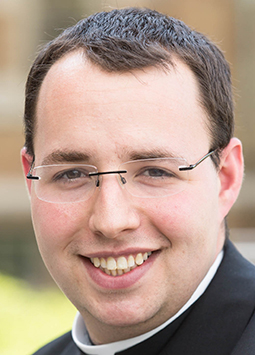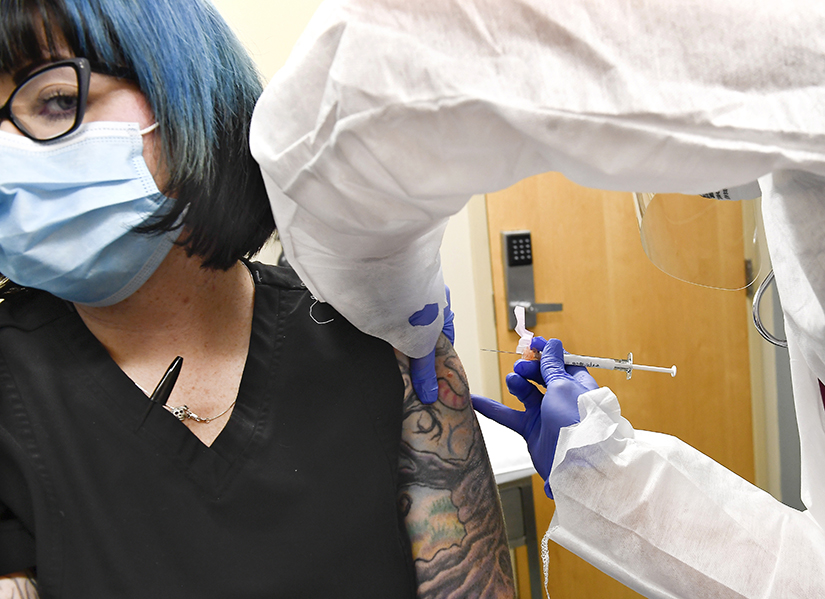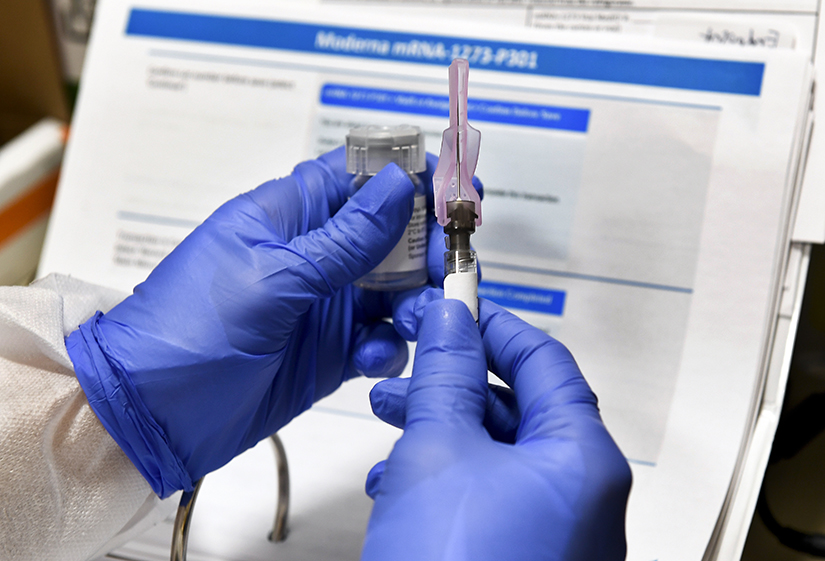As pharmaceutical companies come closer to releasing coronavirus vaccines, several moral issues emerge for consideration among Catholics, said two Catholic health care ethicists.
How the vaccines are made must be considered, including whether they have illicit materials such as abortion-derived cell lines, said Father Peter Fonseca, a bioethicist and parochial administrator of St. Theodore Parish in Flint Hill. With more than two dozen vaccine candidates in development, it is important to understand how they are developed, said Father Fonseca, who holds a certificate in health care ethics from the National Catholic Bioethics Center and a master’s degree in bioethics from the University of Mary.
 Fr. Fonseca
Fr. FonsecaTwo of the primary vaccine candidates, manufactured by Pfizer and Moderna, do not directly use cell lines from fetal tissue taken from the body of an aborted baby, a recent memo from the U.S. bishops reiterated. However, both used aborted fetal cell lines in confirmation status testing, which the bishops have said is a “relatively remote” connection.
The Vatican has long held that vaccines with aborted fetal cell lines are morally permissible if no alternative exists. In 2005, the Pontifical Academy for Life wrote in “Moral Reflections on Vaccines Prepared from Cells Derived from Aborted Human Foetuses” that vaccines that do not have an alternative are necessary in order to “avoid a serious risk not only for one’s own children but also … for the health conditions of the population as a whole — especially for pregnant women.”
But with that comes a responsibility to urge drug manufacturers and health care providers to promote ethically created vaccines. The Pontifical Academy for Life also wrote that there is a “duty to take recourse to alternative vaccines (if they exist), putting pressure on political authorities and health systems so that other vaccines without moral problems become available.”
The Pontifical Academy for Life wrote that Catholics have a responsibility to push for the creation of morally just, alternative vaccines, but it also said they should not sacrifice the common good of public health because there is no substitute.
The Missouri bishops also issued a statement on COVID-19 vaccines, in which they wrote that “everyone should have access to a safe and effective vaccine, and no one should have to face being inoculated with a vaccine derived in an unethical manner.”
The bishops also noted that “vaccines currently in development which utilize problematic cell lines, however, should not keep Catholics from seeking vaccination. Preserving one’s health and that of others outweighs the remote association with past abortions which were neither desired nor intended by those now using the vaccines.”
Who should get the vaccine?
 Nurse Kathe Olmstead, right, administered an injection to volunteer Melissa Harting, of Harpersville, N.Y., as part of a study of a possible COVID-19 vaccine from Moderna.Photo Credits: Ethics and efficacy in an emergency Development of COVID-19 vaccines raise points of consideration when forming our consciences on the issue BY JENNIFER BRINKER [email protected] twitter: @jenniferbrinker Eberl Fr. Fonseca Hans Pennink | Associated Press Nurse Kathe Olmstead prepared a shot as the world’s biggest study of a possible COVID-19 vaccine, developed by the National Institutes of Health and Moderna Inc., began July 27, in Binghamton, N.Y. In November, Moderna sought emergency use authorization from the U.S. Food and Drug Administration. Hans Pennink | Associated Press
Nurse Kathe Olmstead, right, administered an injection to volunteer Melissa Harting, of Harpersville, N.Y., as part of a study of a possible COVID-19 vaccine from Moderna.Photo Credits: Ethics and efficacy in an emergency Development of COVID-19 vaccines raise points of consideration when forming our consciences on the issue BY JENNIFER BRINKER [email protected] twitter: @jenniferbrinker Eberl Fr. Fonseca Hans Pennink | Associated Press Nurse Kathe Olmstead prepared a shot as the world’s biggest study of a possible COVID-19 vaccine, developed by the National Institutes of Health and Moderna Inc., began July 27, in Binghamton, N.Y. In November, Moderna sought emergency use authorization from the U.S. Food and Drug Administration. Hans Pennink | Associated PressAnother consideration is the rapid pace at which coronavirus vaccines have been developed and who should consider getting a vaccine that is in early development, Father Fonseca said.
Moderna and Pfizer have sought emergency use authorization from the U.S. Food and Drug Administration. That means the FDA allows the use of “unapproved medical products, or unapproved uses of approved medical products in an emergency to diagnose, treat, or prevent serious or life-threatening diseases or conditions when certain statutory criteria have been met, including that there are no adequate, approved, and available alternatives.”
But because the vaccine is still experimental, we only have projections of long-term health effects rather than verification, said Father Fonseca. “So perhaps in a situation where someone is immunocompromised, (getting the vaccine) would be good,” he said. “But when the general population is weighing the benefits versus the burdens of receiving the vaccine, they must keep in mind that these vaccines are still experimental.”
Father Fonseca said he’s already fielded questions from Catholics who want to know if the vaccine will be mandated in certain scenarios, such as for health care workers, in schools or other essential care situations. Missouri Gov. Mike Parson has said he would not mandate a vaccine through legislation.
Health care providers should be asked questions related to informed consent, Father Fonseca said. “Anytime I hear the word mandate, my ears go up as a bioethicist,” Father Fonseca said. “Most health care institutions mandate a flu vaccine for their employees, but those vaccines are not experimental.”
For the common good
 Dr. Eberl
Dr. EberlAnother consideration is the ethics behind the distribution of the vaccine, said Dr. Jason Eberl, director of the Albert Gnaegi Center for Health Care Ethics at Saint Louis University and professor of health care ethics.
Entities such as the Centers for Disease Control must consider within a distribution plan who will take priority. Eberl said he expects to see a priority placed on health care workers and others considered “essential” in their line of work.
Vulnerable people who are at greater risk for adverse complications must also be considered, Eberl said. This falls in line with Catholic social teaching, which defines a preferential option for the poor and vulnerable.
A recent statement from the Catholic Health Association called for equitable distribution of the vaccine, once it is available. “Because COVID-19 has had a disproportionate impact on vulnerable populations, such as the elderly, low-income communities, persons with pre-existing health conditions, and racial and ethnic minorities, CHA believes it is essential that any approved COVID-19 vaccine be distributed in a coordinated and equitable manner,” it said.
“I haven’t seen anything in CDC recommendations that would allow such discrimination, but certain forms of discrimination — say, against persons with severe cognitive disabilities — are not specifically ruled out,” Eberl said. “The recommendations are not sufficiently fine-tuned. So it’s all in how those might be interpreted and applied.”
Father Fonseca said another point worth noting is the meaning of “common good.” While we have an obligation to the common good, we can’t reduce it simply to public health. Spiritual, psychological and other goods must be considered as well. “A big concern for me is that the vaccine is going to become weaponized like masks have,” he said. “Everyone needs to weigh the burdens and benefits of the vaccine for themselves, and we have to respect people’s rights to make those judgements.”
>> Further reading
Missouri Department of Health and Senior Services COVID-19 vaccine information: covidvaccine.mo.gov
National Catholic Bioethics Center: www.ncbcenter.org
Charlotte Lozier Institiute on COVID-19 vaccine candidates and abortion-derived cell lines: bit.ly/39AUeQP
Archdiocesan Respect Life Apostolate: Call (314) 792-7555
Catholic Health Association: www.chausa.org/newsroom/coronavirus-resources
Bishops say Pfizer, Moderna COVID-19 vaccines are morally acceptable
While not completely free of connection to abortion, Moderna and Pfizer vaccines weren’t developed or produced using fetal stem lines from aborted fetuses
By Julie Asher | Catholic News Service | Twitter: @jlasher
WASHINGTON — Using the coronavirus vaccines produced by Pfizer Inc. and Moderna is not immoral, the chairmen of the U.S. bishops’ doctrine and pro-life committees said Nov. 23.
 Nurse Kathe Olmstead prepared a shot as the world’s biggest study of a possible COVID-19 vaccine, developed by the National Institutes of Health and Moderna Inc., began July 27, in Binghamton, N.Y. In November, Moderna sought emergency use authorization from the U.S. Food and Drug Administration.Photo Credits: Hans Pennink | Associated PressBishop Kevin C. Rhoades of Fort Wayne-South Bend, Indiana, chairman of the U.S. Conference of Catholic Bishops’ Committee on Doctrine, and Archbishop Joseph F. Naumann of Kansas City, Kansas, chairman of the USCCB Committee on Pro-Life Activities, addressed the issue in a memo to their brother bishops.
Nurse Kathe Olmstead prepared a shot as the world’s biggest study of a possible COVID-19 vaccine, developed by the National Institutes of Health and Moderna Inc., began July 27, in Binghamton, N.Y. In November, Moderna sought emergency use authorization from the U.S. Food and Drug Administration.Photo Credits: Hans Pennink | Associated PressBishop Kevin C. Rhoades of Fort Wayne-South Bend, Indiana, chairman of the U.S. Conference of Catholic Bishops’ Committee on Doctrine, and Archbishop Joseph F. Naumann of Kansas City, Kansas, chairman of the USCCB Committee on Pro-Life Activities, addressed the issue in a memo to their brother bishops.
“Neither the Pfizer nor the Moderna vaccine involved the use of cell lines that originated in fetal tissue taken from the body of an aborted baby at any level of design, development or production,” the two prelates said. “They are not completely free from any connection to abortion, however, as both Pfizer and Moderna made use of a tainted cell line for one of the confirmatory lab tests of their products.
“There is thus a connection, but it is relatively remote,” they continued. “Some are asserting that if a vaccine is connected in any way with tainted cell lines, then it is immoral to be vaccinated with them. This is an inaccurate portrayal of Catholic moral teaching.”
Bishop Rhoades and Archbishop Naumann cited three Vatican documents that “treat the question of tainted vaccines”: the 2005 study by the Pontifical Academy for Life, “Moral Reflections on Vaccines Prepared from Cells Derived From Aborted Human Fetuses”; paragraphs nos. 34-35 in the 2008 “Instruction on Certain Bioethical Questions” (“Dignitatis Personae”) by the Congregation for the Doctrine of the Faith; and the 2017 “Note on Italian Vaccine Issue,” by the Pontifical Academy for Life.
“These documents all point to the immorality of using tissue taken from an aborted child for creating cell lines,” they explained. “They also make distinctions in terms of the moral responsibility of the various actors involved, from those involved in designing and producing a vaccine to those receiving the vaccine.
“Most importantly,” they added, “they all make it clear that, at the level of the recipient, it is morally permissible to accept vaccination when there are no alternatives and there is a serious risk to health.”
In a Nov. 21 statement, the president and CEO of the Catholic Health Association, Mercy Sister Mary Haddad said CHA ethicists, “in collaboration with other Catholic bioethicists,” used the guidelines released by the Vatican’s Pontifical Academy for Life in 2005 and 2017 on the origin of vaccines and “find nothing morally prohibitive with the vaccines developed by Pfizer and BioNTech (Pfizer’s German partner) and Moderna.”
She also said CHA “believes it is essential that any approved COVID-19 vaccine be distributed in a coordinated and equitable manner,” because COVID-19 “has had a disproportionate impact on vulnerable populations, such as the elderly, low-income communities, persons with preexisting health conditions, and racial and ethnic minorities.”
CHA encouraged Catholic health organizations “to distribute the vaccines developed by these companies.”
On Nov. 11, Pfizer and BioNTech announced that results of a large ongoing study show its vaccine is 95% effective; the vaccine is already being manufactured and has been since October. Five days later, Moderna said preliminary data from its phase three trial shows its coronavirus vaccine is 94.5% effective in preventing COVID-19.
Pfizer and Moderna are applying to the U.S. Food and Drug administration for emergency approval of the vaccines, which would quickly pave the way for distribution of the vaccines. The FDA is to meet Dec. 10.
As soon as the FDA approves their vaccines for distribution, the U.S. government hopes to distribute 300 million doses around the country by January. Because Moderna and Pfizer’s vaccines involve two shots per person, this would be enough to immunize 150 million Americans.